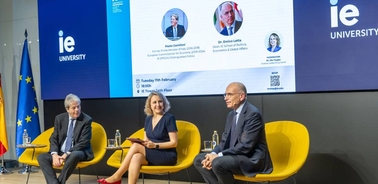The Future of Europe: A Conversation with Paolo Gentiloni and Enrico Letta at the Global Policy Center

The Global Policy Center (GPC) together with IE University’s School of Politics, Economics and Global Affairs (SPEGA) recently hosted an engaging and insightful discussion on the future of Europe, featuring two prominent figures in European politics: Paolo Gentiloni, former Prime Minister of Italy and former European Commissioner for Economic and Financial Affairs, and Enrico Letta, former Italian Prime Minister and current Dean of IE SPEGA. The event was moderated by Ilke Toygür, Director of the GPC.
This high-profile discussion took place amid a rapidly evolving European and global landscape, where the EU is confronting multiple strategic challenges. From economic fragmentation to the need for defense integration and the consequences of Donald Trump’s return to the White House, the conversation underscored many topics regarding the urgency of reforming and strengthening European governance.
A Europe at Crossroads
Opening the discussion, Enrico Letta framed the conversation within the broader challenges facing Europe today. He emphasized that Europe is at a crossroads, with deep economic and governance transformations on the horizon. The discussion revolved around economic security, strategic autonomy, and Europe’s response to global political shifts, including the upcoming U.S. presidential elections.
Letta pointed out that the European Economic and Monetary Union remains incomplete, stating: "We were very good with the ‘M’ of the EMU—monetary union. But we failed to complete the ‘E’—economic union." He argued that despite having a single currency, Europe still operates with 27 different financial, telecom, and energy markets, limiting its competitiveness and strategic capabilities.
The Need for European Defense Integration
Paolo Gentiloni focused on the geopolitical realities facing Europe, stressing that the EU needs to take its defense more seriously. He remarked that discussions around European common defense have been ongoing for nearly three decades, but without tangible results.
"This is the moment. The changing global security order demands that we take defense into our own hands. Europe cannot continue to rely on external security guarantees," said Gentiloni.
He argued that a European Defence Fund (EDF) is a starting point, emphasizing, "We are already spending more on defense, but we need to direct those investments into European industry." Gentiloni backed the fund as a mechanism to finance shared security initiatives, ensuring that EU countries prioritize European-made defense systems over purchases from external suppliers.
In response to a student’s question about how neutral countries like Austria and Malta would fit into an EU defense framework, Gentiloni reassured that these nations would not be compelled to participate in military interventions but could engage in aspects of defense collaboration that align with their constitutional positions.
Trump 2.0: What it Means for Europe
With speculation over Trump’s second presidency, both panelists argued that his mandate will change transatlantic relations. Ilke Toygür raised concerns over the future of NATO, U.S. commitments to European security, and economic ties between the two powers, pressing the urgent question: "Is Europe prepared for a world where U.S. support is uncertain?"
Gentiloni responded with a stark warning: "Trump or not, we must stop being ‘bonsai powers.’ Europe must act as one, not as 27 fragmented entities." He cautioned that Trump’s second term could bring an even more unpredictable and unilateral U.S. approach, undermining Europe’s ability to coordinate effectively with Washington on issues like climate policy, trade, and multilateral diplomacy. "We cannot afford to wait and react. Europe must act preemptively, building its own strategic resilience," he urged.
Letta echoed the call for unity, emphasizing that the EU needs to strengthen its strategic autonomy and economic resilience. "We should not base our long-term strategy on external dependencies, be it in defense, technology, or energy," he said.
Economic Security and the EU’s Global Role
The conversation also addressed the increasing emphasis on economic security in Brussels. Toygür noted that while the EU has long championed an open economy, recent global shocks—such as COVID-19, the energy crisis, and rising geopolitical tensions—have forced Europe to rethink its supply chains and dependencies.
Gentiloni agreed that economic security should not be confused with protectionism. He highlighted recent EU efforts to diversify its trade relationships, signing agreements with Mercosur, Mexico, and Malaysia, and ongoing negotiations with India. "We need open strategic autonomy—ensuring resilience while maintaining global economic openness," he explained.
European Enlargement and Multi-Speed Integration
Another topic was the future of EU enlargement, particularly in relation to Ukraine and the Western Balkans. Letta acknowledged that while expansion is necessary, it cannot happen without deep institutional reforms: "We cannot bring in new members while keeping the current governance system unchanged. Otherwise, the EU will become as ineffective as the UN," he warned.
The discussion also touched on the controversial idea of a two-speed Europe, where some countries integrate faster in key areas while others follow at their own pace. Could a multi-tiered EU be the solution to governance paralysis? Letta suggested that the euro and Schengen are already examples of differentiated integration, and this model might need to be expanded.
Looking Ahead: More Europe, Not Less
As the event concluded, both speakers reinforced a common theme—that Europe must act boldly to remain a strong global player. Whether in defense, economic policy, or foreign affairs, the EU must deepen integration to tackle the challenges of the 21st century.
Toygür wrapped up the discussion with a note of optimism, inviting Gentiloni back for a future session to continue exploring how Europe can navigate its defining decade.
Stay tuned for more events from the Global Policy Center, where top policymakers and experts continue to shape the conversation on Europe's future.